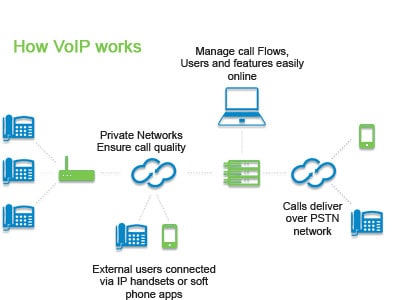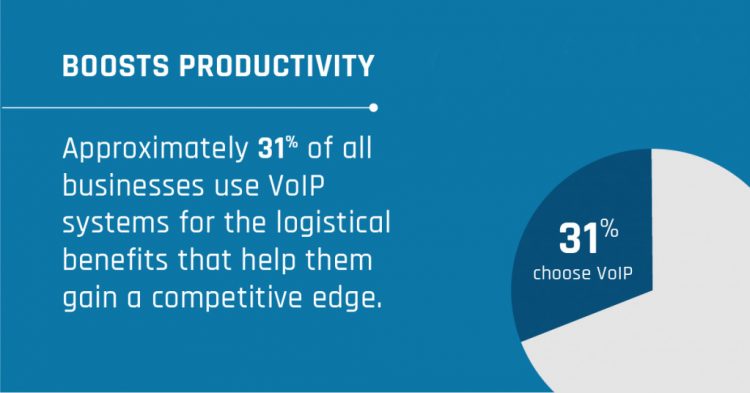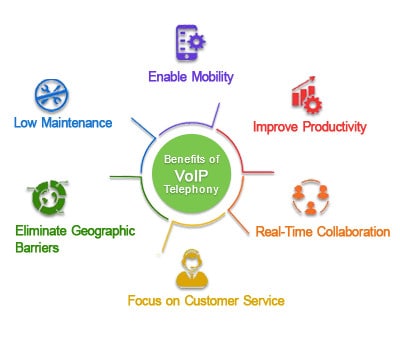
Do you use phone calls for business communication? Are you getting the best out of your current telephony operations? Would you like to reduce the workload of your IT team? Let’s explore how a modern solution like VoIP can make your operations more efficient!
But before we discuss the contributions of a VoIP phone system to business productivity, here’s an overview of its capabilities.
Decoding VoIP phone systems
VoIP stands for Voice over Internet Protocol. It is an internet-powered telephone service that can be used for customer support, sales, IT, and HR functions.
A VoIP phone system doesn’t use a regular landline or mobile network to make or receive voice calls. Instead, it uses the internet to connect with other phone networks.
Let’s understand how this technology differs from traditional phones in its functioning!
In an analog phone system, your voice is transmitted to the other end using circuit cables. These cables are more prone to disturbances and call drops. And any damage to the wires can hamper business continuity. Take, for example, a landline connection. First, you would need physical hardware and a subscription from a local carrier. You would then have to shell out additional charges for installing, customizing, maintaining, and updating your system. But you can avoid all this with VoIP services.
A VoIP phone system runs on the cloud. In other words, it converts your voice signals into digital signals over a broadband connection. Hence, downtime risks are significantly lower than landline phones.
Cost-effectiveness is another positive factor. In an internet-based system, you don’t need additional telephonic hardware or connections. With VoIP, you can make or receive phone calls on the go at a fraction of landline rates. All you need to do is plug your VoIP phone into your modem or router to start your call operations at once!
Moreover, VoIP enables better customer experiences due to the superior audio quality it facilitates as compared to dial-up connections. Your voice is initially converted into tiny data packets, separately transferred to the intended destination, and then packaged together. So, the receiver gets to hear your messages with much more clarity.
How a VoIP phone system spurs business productivity
Adopting VoIP technology can prove immensely useful from a business point of view. It offers flexible multimedia support on the internet, across voice, audio, video, etc. And you can install it effortlessly, using a PC, laptop, or smartphone. Software upgrades and bug fixes can also be managed remotely.
There are many other features of VoIP phone systems that contribute to improved communication processes and business productivity. The evidence from the industry suggests the following:
-
Time efficiency
According to a Cisco report, VoIP call systems can help your business can save up to 32 minutes of calls per team member in a day. Nowadays, VoIP providers package a wide range of easy-to-understand properties in the toolbox to assist you in quick service provision.
-
Cost savings
Implementing VoIP solutions leads to cost savings for businesses of any scale. Tech Co reports that small enterprises can cut back 40% on local calls and nearly 90% on international calls by switching to a VoIP phone system. Even large corporations like Dell have observed favorable results. A company-wide shift to telecommuting, enabled by VoIP, helped the tech MNC save $39.5 million.
-
Customer service capabilities
VoIP technology provides a host of features like interactive voice response (IVR), call waiting, forwarding, conferencing, voicemail, and silent call monitoring. A cloud phone system typically comes with real-time dashboard functionality, allowing centralized control and management like any software dashboard.
-
Data-backed performance
Your call center administrators can keep a tab on the VoIP system’s performance using various metrics like call duration, service quality, complaint closure, and so on. Modern applications usually support advanced analytics, which guides the optimization of call menus and enriches customer service.
-
Reduced IT workload
Since VoIP is a cloud-based telephony tool, it’s significantly lighter to implement than any other communication method. Your IT staff has to do the bare minimum as there’s no hardware requirement. You don’t have to buy any equipment like handsets, line connections, circuit switch boxes, PBX, etc.
-
Business continuity
VoIP systems are less likely to run into technical problems. They don’t encounter any wire circuitry issues or call disruptions that analog phone services face. The sheer lack of dependence on hardware permits smooth business functioning. A cloud phone system works as per plan unless there’s an internet connectivity issue.
-
International calls
Opting for VoIP opens up doors for global business reach. You can hire your call agents from any location as the telephone machinery is not chained to a physical space. Present-day systems are also able to bring affordability to both domestic and international calls. Features like virtual phone numbers and call masking come in handy when your call operations are remote.
-
Capacity expansion
Cloud-based telephony is easier to scale than other systems that bog down users with upfront costs. VoIP solutions generally have a pay-per-use or subscription costing model, allowing hassle-free and agile expansion. So, taking your small business to the next level doesn’t involve high working capital costs.
It’s evident from the above points that VoIP technology also proves conducive to the remote arrangements that are on the rise today. Research highlights that telecommuting and flexible working can make workers happier. And this is directly linked to how they perform their job duties! Harbor Network statistics also show that companies can increase their productivity by 20% by choosing VoIP phone systems.
VoIP: The preferred 21st-century Telephony Solution
Business adoption of VoIP services is poised to grow as 5G networks and artificial intelligence gain more popularity. VoIP mobile users are projected to grow further in the coming years, while Forbes estimates that AI chatbots will dominate customer interactions by 2025.
In this evolving landscape, heavy reliability on dated phone systems can burn a hole in your pocket. Those who don’t want to be left behind are already looking to integrate VoIP with mobile apps, voicemail, and other software. 21st-century businesses are also harnessing multi-level IVR and call center analytics to meet customer expectations.
Here’s an example of a retail company that used unified communications to its advantage.
Jeanswest had been using traditional phones for a long time. But their customer service staff couldn’t keep track of the incoming, outgoing, and missed calls. This prompted them to search for an alternative. They finally selected a cloud telephone platform that offered monitoring and reporting functions. By doing this, Jeanswest provided feedback to call agents, improved service standards, and made informed decisions to boost productivity.
It’s clearly beyond doubt that a VoIP phone system can help you transform your business communications and push up your performance metrics!






